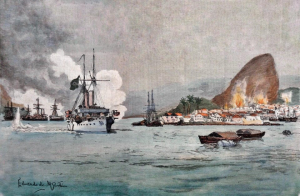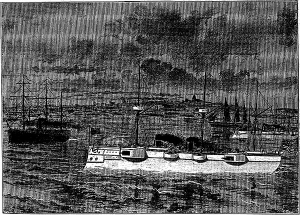Revolta da Armada, Eduardo Martino, 1893
(L’Univers illustré, Levy (Paris), nº 2.029, 10 February 1894).
Brazil’s young republic didn’t have a smooth beginning. Fears of internal turmoil early on motivated the United States’ choice to delay its official recognition of the new republic. Because Dom Pedro II was well regarded by American thinkers and politicians, many chose not to declare support for the new regime right away, instead opting to observe whether the Brazilian people actually supported and considered the regime to be legitimate. This was cause for some partisan debate in the United States. Eventually, however, the U.S. Congress did recognize Brazil.
Several years later, a revolt led by Brazilian Navy officials against President Floriano Peixoto (1891-94) thrust the governments of Brazil, the United States, and the United Kingdom into diplomatic turmoil. The young republic asserted its sovereignty and showed mastery of the tools of international pressure as the two superpowers attempted to influence its domestic politics. Brazil’s diplomatic muscle was also on display in the trade treatises it signed, and also into those it chose not to make. The United States, eager to build friendly relations with Brazil, made a trade treaty with significant concessions. This concerned the United Kingdom’s leaders as they worried about losing their space as the Latin American country’s primary international partner, and motivated them to seek new trade deals. Still, Brazil asserted its stance to not make concessions to the European power. In all these instances, it became clear that Brazil and its elites were articulating and expressing their economic and political interests in the international arena.
Readings:
Joseph Smith, “Limits of Diplomatic Influence: Brazil versus Britain and the United States, 1886-1894.” | English
Fred Rippy, “The United States and the Establishment of the Republic of Brazil” | English
Documents:
Grover Cleveland, “State of the Union Address”, December 4th, 1893. | English
Further readings:
Texto Completo, “A Diplomacia do Marechal”, Sergio Corrêa da Costa | Português





